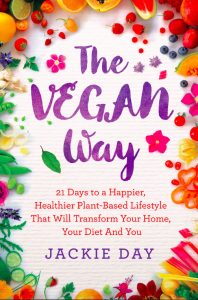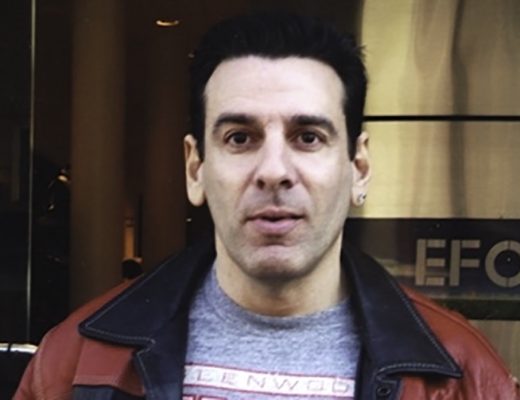The Vegan Way: 21 Days to a Happier, Healthier
Plant-Based Lifestyle that Will Transform Your
Home, Your Diet, and You
Jackie Day
St. Martin’s Griffin, $25.99
In The Vegan Way, written by Jackie Day, we are drawn in with a question: “If you were stranded alone on a deserted island with nothing to eat but animals, would you eat them?” But then she stops us, says “Don’t answer that,” and reminds us that we will probably never be stranded on a deserted island. This is just the first example of many moments in the book where I had to stop and laugh. I found myself—even as a vegan—saying “Well, yeah I would,” and then punching myself because I rarely even leave my house. When would I be on a deserted island?
The book begins with a tale of Day’s road to veganism and we learn that she went vegan at twenty-three because a girl she met explained that drinking milk and eating honey were harming animals just as much as eating a burger. Day’s book is extremely conversational, and I found myself having an internal conversation about my own path to veganism. Eight years ago, I decided to go vegan and I told people it was because I couldn’t digest dairy properly, which is true, but the more honest answer was that I wanted to go vegan to get a boy to like me. I am confident Day would laugh at this story, that’s how much I feel like I know her after reading this book.
A mixture of cookbook, self-help, and the politics of meat and dairy consumption, Day’s book is optimistic, honest, funny, and very vulnerable. It’s written in an essay-like fashion that sometimes meanders into journalism with recipes sprinkled throughout. These aren’t complicated recipes that require niche ingredients like sunflower extract, but rather, recipes that anyone can make. They call for simple ingredients such as a variety of vegetables, spices, flour, and legumes. One point that Day’s book makes is not to discourage readers by asking them to make a dish with thirty ingredients and fifty-two steps. Most of the recipe instructions are something like “Chop these things up and toss them in a pan with oil.” Simple as that.
We weave in and out of twenty-one chapters that are meant to be read one day at a time. There are goals that align with each day, and a checklist at the end of each chapter to help you better achieve these goals. A few of the goals read: “Memorialize what inspires you to become vegan,” “Switch out dairy from your morning beverage or cereal and replace it with a healthy plant-based milk,” and “Introduce your taste buds to vegan cheese.” These goals are meant to be accessible, and she breaks them down carefully for the reader. As a person that needs structure to actually get anything done, I find that tangible goals and checklists are essential. It would have been easy for Day to write each chapter and end on an optimistic anecdote, but instead, she lays out the chapter for us with a few bullet points and asks “Did you do these things?” As readers, we are given the satisfaction of checking them off when we get them done.
However, Day doesn’t sugarcoat anything. She knows that while we might not want to hear about how the meat and dairy industries are in bed with the USDA, we need to know. Day writes, “I don’t like watching animal abuse, reading about animal abuse, or writing about animal abuse, but I promised I wouldn’t skirt the truth about what really happens to animals.” She does not include any crude photos of animal cruelty and we don’t need them—her descriptions are enough to turn anyone’s stomach. Did you know that 277 cows are slaughtered every 30 seconds? Did you know that approximately one million birds are boiled alive each year? Me neither.
The Vegan Wayis full of useful advice, but the most important thing Day does is push the reader to keep learning. She doesn’t expect people to only read her book, but to do more research. She even begins that research for us by including a resource index with recommended readings and viewings, and including examples of grocery stores with vegan options, vegan food advice when traveling, and organizations that fight for animal rights throughout the book. She even gives some humorous advice on how to deal with Bacon Bob, the dude that shouts “Mmmm bacon!” every time you walk by.
The Vegan Way plays with form in a way that I haven’t seen before. It is essay, self-help, cookbook, and journalism. There is not a right way to write any of these forms. The point of an essay is to “to try,” which means that you often begin with a question that is never answered, but rather, raises even more questions. Conversely, journalism is more clear-cut and structured because it is meant to give us answers. Day combines these forms because she understands that while she can give us all the advice in the world, we must discover what works for us. There are answers, but there are always going to be even more questions.
This book isn’t about becoming the perfect vegan, it is about being compassionate and knowledgeable. Just as Day married someone that eats meat, I am in love with a meat eater and I’ve had to sit down with his family on holidays and tell them I wouldn’t have what they spent hours preparing. This has always been hard and awkward for me, but The Vegan Wayreminded me that this is a small moment in a larger movement. I might feel uncomfortable for an hour or two, but I am helping reduce the suffering of animals and the impact the meat and dairy industries have on the environment. I think Day put it perfectly: “This is a book of empowerment, not despair.”
_______________
Brooklyn Kiosow is a writer and MFA candidate in creative nonfiction at Columbia College Chicago. She has been published in Peculiars Magazine and has a forthcoming essay in Hair Trigger. You can find her on Instagram https://www.instagram.com/brooklynkiosow/.



